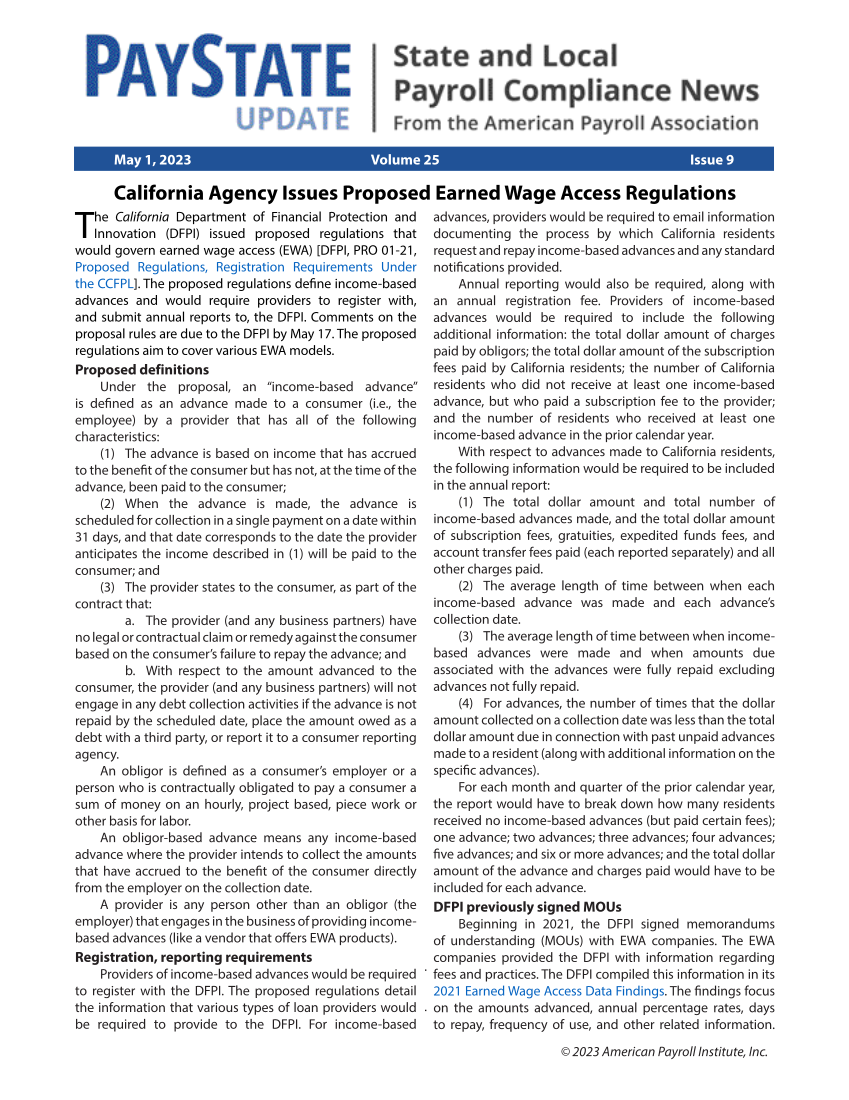© 2023 American Payroll Institute, Inc. California Agency Issues Proposed Earned Wage Access Regulations The California Department of Financial Protection and Innovation (DFPI) issued proposed regulations that would govern earned wage access (EWA) [DFPI, PRO 01-21, Proposed Regulations, Registration Requirements Under the CCFPL]. The proposed regulations define income-based advances and would require providers to register with, and submit annual reports to, the DFPI. Comments on the proposal rules are due to the DFPI by May 17. The proposed regulations aim to cover various EWA models. Proposed definitions Under the proposal, an “income-based advance” is defined as an advance made to a consumer (i.e., the employee) by a provider that has all of the following characteristics: (1) The advance is based on income that has accrued to the benefit of the consumer but has not, at the time of the advance, been paid to the consumer (2) When the advance is made, the advance is scheduled for collection in a single payment on a date within 31 days, and that date corresponds to the date the provider anticipates the income described in (1) will be paid to the consumer and (3) The provider states to the consumer, as part of the contract that: a. The provider (and any business partners) have no legal or contractual claim or remedy against the consumer based on the consumer’s failure to repay the advance and b. With respect to the amount advanced to the consumer, the provider (and any business partners) will not engage in any debt collection activities if the advance is not repaid by the scheduled date, place the amount owed as a debt with a third party, or report it to a consumer reporting agency. An obligor is defined as a consumer’s employer or a person who is contractually obligated to pay a consumer a sum of money on an hourly, project based, piece work or other basis for labor. An obligor-based advance means any income-based advance where the provider intends to collect the amounts that have accrued to the benefit of the consumer directly from the employer on the collection date. A provider is any person other than an obligor (the employer) that engages in the business of providing income- based advances (like a vendor that offers EWA products). Registration, reporting requirements Providers of income-based advances would be required to register with the DFPI. The proposed regulations detail the information that various types of loan providers would be required to provide to the DFPI. For income-based advances, providers would be required to email information documenting the process by which California residents request and repay income-based advances and any standard notifications provided. Annual reporting would also be required, along with an annual registration fee. Providers of income-based advances would be required to include the following additional information: the total dollar amount of charges paid by obligors the total dollar amount of the subscription fees paid by California residents the number of California residents who did not receive at least one income-based advance, but who paid a subscription fee to the provider and the number of residents who received at least one income-based advance in the prior calendar year. With respect to advances made to California residents, the following information would be required to be included in the annual report: (1) The total dollar amount and total number of income-based advances made, and the total dollar amount of subscription fees, gratuities, expedited funds fees, and account transfer fees paid (each reported separately) and all other charges paid. (2) The average length of time between when each income-based advance was made and each advance’s collection date. (3) The average length of time between when income- based advances were made and when amounts due associated with the advances were fully repaid excluding advances not fully repaid. (4) For advances, the number of times that the dollar amount collected on a collection date was less than the total dollar amount due in connection with past unpaid advances made to a resident (along with additional information on the specific advances). For each month and quarter of the prior calendar year, the report would have to break down how many residents received no income-based advances (but paid certain fees) one advance two advances three advances four advances five advances and six or more advances and the total dollar amount of the advance and charges paid would have to be included for each advance. DFPI previously signed MOUs Beginning in 2021, the DFPI signed memorandums of understanding (MOUs) with EWA companies. The EWA companies provided the DFPI with information regarding fees and practices. The DFPI compiled this information in its 2021 Earned Wage Access Data Findings. The findings focus on the amounts advanced, annual percentage rates, days to repay, frequency of use, and other related information. May 1, 2023 Volume 25 Issue 9
Printed for: PayrollOrg Bookshelf © 2024 American Payroll Institute, Inc. All Rights reserved. From: PayrollOrg Digital Publications (bookshelf.payroll.org)






